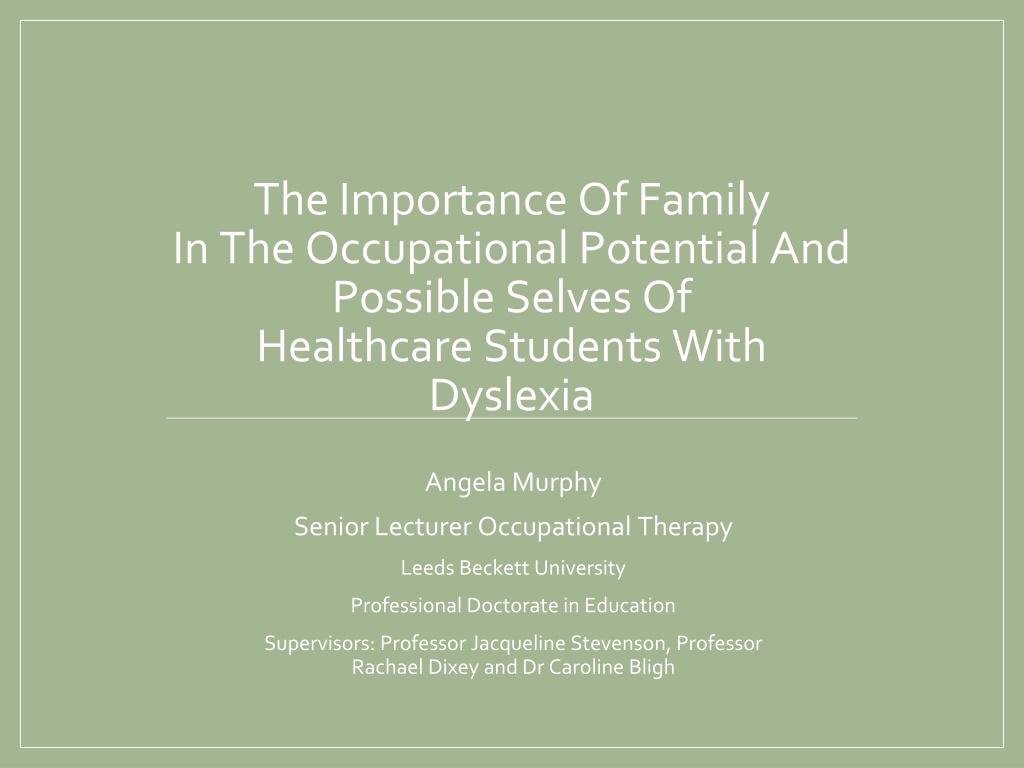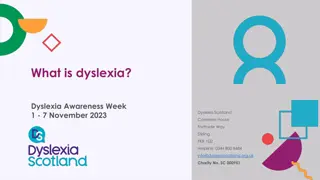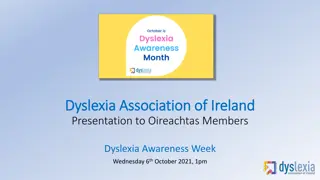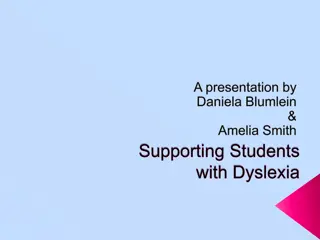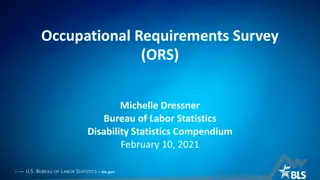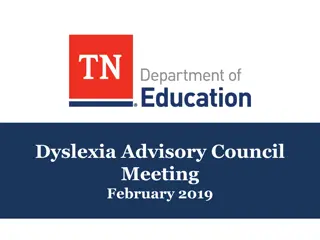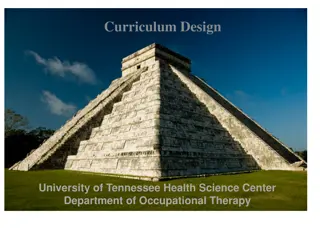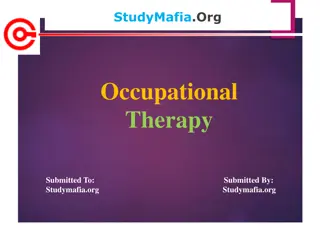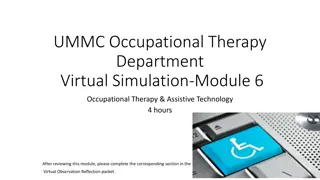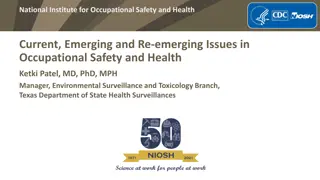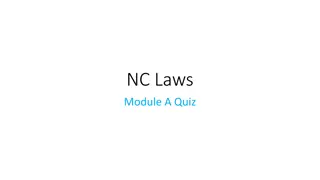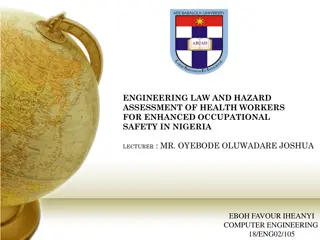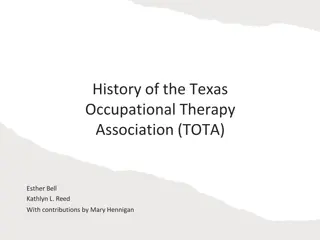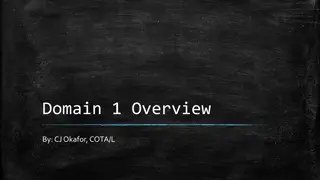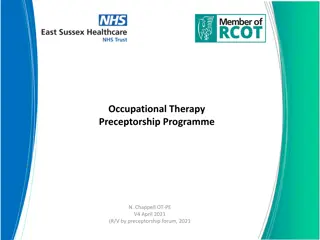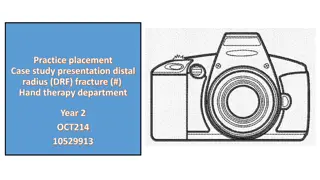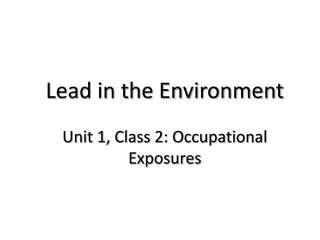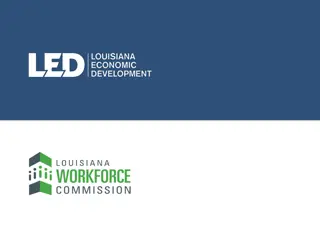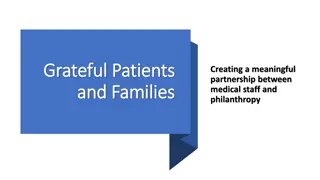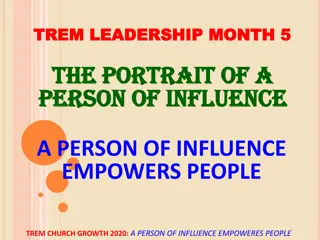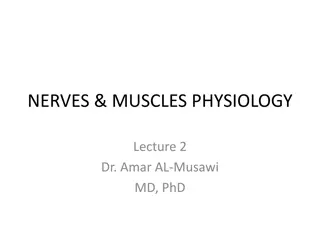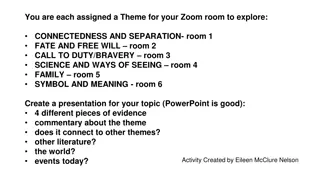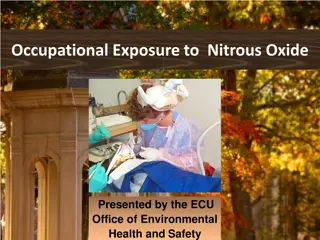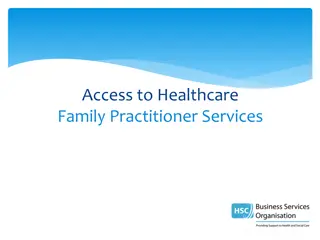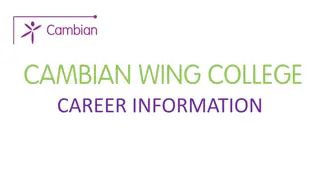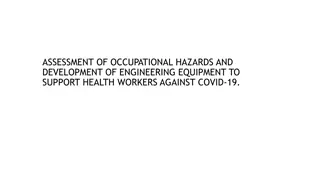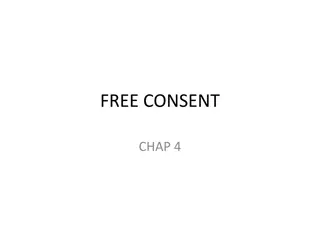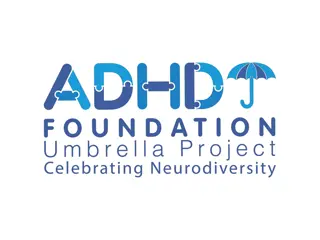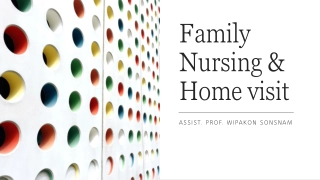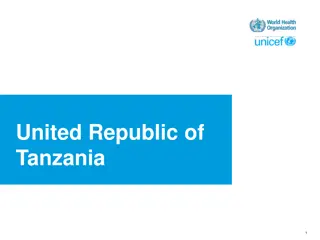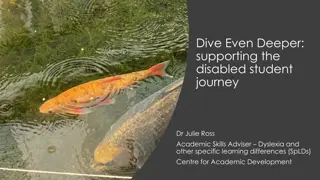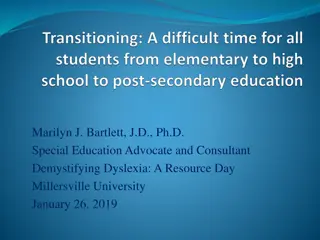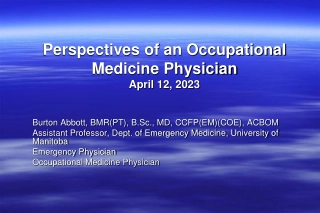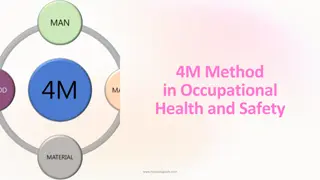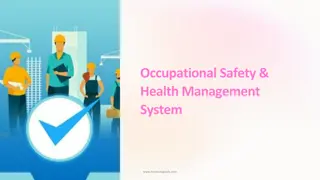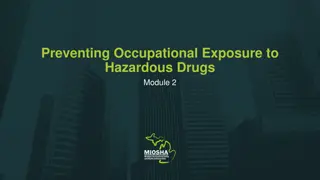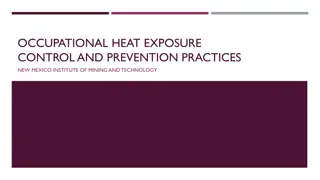The Influence of Family on Occupational Potential of Healthcare Students with Dyslexia
This study explores the impact of family support on the occupational potential and possible selves of healthcare students with dyslexia. Through narrative inquiry and theoretical concepts like possible selves and occupation, the research delves into the unique presentations of dyslexia and its social realities. With a focus on pragmatic strategies employed by parents, the study aims to understand how family dynamics can shape the future outcomes of students with dyslexia in healthcare education.
Download Presentation

Please find below an Image/Link to download the presentation.
The content on the website is provided AS IS for your information and personal use only. It may not be sold, licensed, or shared on other websites without obtaining consent from the author. Download presentation by click this link. If you encounter any issues during the download, it is possible that the publisher has removed the file from their server.
E N D
Presentation Transcript
The Importance Of Family In The Occupational Potential And Possible Selves Of Healthcare Students With Dyslexia Angela Murphy Senior Lecturer Occupational Therapy Leeds Beckett University Professional Doctorate in Education Supervisors: Professor Jacqueline Stevenson, Professor Rachael Dixey and Dr Caroline Bligh
Research question What influences the occupational potential and possible selves of healthcare students with dyslexia?
Theoretical concepts Possible selves - who we hope to become or fear becoming in the future (Markus and Nurius, 1986) Occupation: the meaningful and purposeful things we do which help us to become who we are and who we want to be (Wilcock, 2001). Pragmatic strategies are put in place by some parents to help their children reach their potential (Oyserman, Brickman & Rhodes, 2007; Zhu et al, 2014). Occupational Potential: reaching our potential in the things we do (Wicks, 2005)
The occupational potential and possible selves of healthcare students with dyslexia: A Narrative Inquiry Narrative Inquiry (Clandinin and Connolly, 2000) plots and three dimensional structures: temporality (moving backward and forward between the past, present and future); personal and social dimensions (feelings, hopes, reactions and existential conditions or context) and place the specific physical inquiry space where inquiry and events take place (Clandinin, 2006). Three semi structured interviews per participant (past, present and future) Nine students (OT, PT, Ost.) M level, diagnosis of dyslexia. Age range: 24-46; 8/9 middle classed, two parent families; 1/9 working class and single parent family; all white and from England; some first generation university students.
Dyslexia: Unique presentations; reading, writing, processing skills, memory (working, short term, long term) organisation, numbers, maths Not just about spelling and reading Not about intelligence Often not considered bad enough to cause concern Can t see it Not laziness Can be exhausting Dyslexia Association; Dyslexia Action; Dyslexia Trust
Dyslexia Social Reality of Dyslexia (MacDonald, 2009; 2010; 2012) Can have a significant impact on life course many people may not reach their potential particularly within lower socio economic status groups (MacDonald, 2010; 2012) Between 20-51% of offenders have dyslexia. (Macdonald, 2012) Labelling/ diagnosis is often avoided (Riddick, 2000) Learned helplessness (Kerr, 2005) Myth, debate (Elliot, 2005; Elliot & Gregerenko, 2014) Disclosure can be a complex issue (Nalavany, Carawan & Sauber, 2013) Families play a longer, more substantial supportive role (Nalavany, Carawan & Sauber, 2013) Biological explanation for Dyslexia (Christodoulou, et al, 2014) Strategies can help neuroplasticity (Heim, 2015) Many parents struggle to gain support for children in school (Rose, 2009; Lamb, 2009; Gove, 2011)
Findings: The importance of family (narrative sub plots) Pragmatic parenting - a nuanced approach Aspirations and parental possible selves; teacher, Nasa Dyslexia in the family: fathers, mothers, grand parents, cousins, sons A happy possible self After all we ve done and been through, you could at least be happy now! (Jessica). Co occupations and shared habits and interests you can do it we used to try different ways nothing was ever too hard
Findings: The Importance of Family Occupations (what we do) introduced during childhood: important to counteract negative effects and help the participants reach their occupational potential (Wicks, 2005) and desired possible selves (Markus and Nurius, 1986).
A fine line Parents guide, support, maintain hopes, encourage, aspire, manage/maintain/adapt expectations Throughout childhood, undergraduate and post graduate studies.
Pragmatic parenting: a nuanced approach Joanne use of story writing/ home schooling I loved it yeah, umm I think it meant my education could be tailored towards me As far as always suspecting that I had dyslexia or something around that, my mum always knew I had loads of issues with writing and spelling and stuff like that but I also really liked it and always wanted to write stories you know fantastical or kind of imaginative stories or whatever; but I always struggled with the actual spelling. But she didn't make a big deal of it at all and just kind of encouraged me anyway and we had this little thing; if I couldn't spell stuff I would like, do a little squiggle. If I didn't know what the letters were - which sometimes didn't work if I couldn't remember what the words were (laughs). Lots of squiggles everywhere! Joanne s occupational potential grew with writing and she developed a future possible self as an academic as a result of this encouragement and positive reinforcement from her Mum. Went to a red brick university; English and philosophy; MSc Art therapy; Msc OT
contrasting withAbigail Abigail: So umm I went through primary school and quite quickly the teachers realised I wasn t a genius. I couldn t read and my main struggle was spelling I struggled even at a young age. PS as teacher I got more and more aware of it as I came up through primary school I was always in mainly the middle or bottom table and I got more and more aware of it as I came up through primary school into year 5 and 6. Umm where we had to do spelling tests, spelling tests where we had to stand up and say the word. It was awful! I just, I can write them better. Even now it s hard to do that, like, I might know them better. Umm and I always knew. I find that hard. I always knew I d be really upset if a spelling test was coming along and then I can really remember in year 5, a teacher stood me up and said this is the worst speller in the world and asked me to spell, because we were going round doing spelling; a 3 letter word and asked me to spell ton and I put an e on the end but I was panicking as soon as I stood up. I was really panicking. I was so upset (crying), I, (crying). Mum was quite angry, it was a difficult position to be in. Mum could keep pushing it (at school) but she couldn't say anything to me. It was quite hard for her because she was very gentle about what she said to me but she didn't want to make a big deal for me, which I appreciated.
Abigail Yeah they always used to say K the eldest had the beauty, L had the brains and I had the braun But I was really proud of my gymnastics because I did it to national level so I was really into it, yeah Yeah it gave me a lot of confidence in myself so actually I kind of took it because I did this and my mum loved supporting me and that was my thing that was different from my sisters so like I benefitted from gymnastics and sport I spent so much time there when I was younger and I loved it. I loved the discipline, the organisation, I loved that I was good at it. It gave me a lot. She (Mum) feels she failed a little bit with my sisters; we think my sister has dyslexia too but she got in with the wrong crowd and had children really young. She s a fantastic mum!
and David David: Yeah, we had a teacher who was like an old school teacher and there was me and this other lad who was in the year above but we were together cos it was such a small school that the years were together. She proper showed us up she like err I couldn t write very well for a long time and she used to make us go up to do it and would proper have a go and she took us from the hall, dragged us in, made us keep doing it, made us go up in front of the class and kept doing it and stuff. It was quite bad and then Brad the little lad told his Mam and she complained and she was suspended and we didn t see her again but I don t know if she came back or not after we left. But because of that we got dyslexia tested and it turned out I was quite viciously dyslexic. AM: You say viciously? David: Yes I m better now but especially earlier on it was a mixture of being dyslexic and not wanting to learn and so I wasn t in good stead cos like, I didn t have much confidence in doing things
Jessica Year six teacher: She s not the cleverest child, she won t get to university. Mum: You do have to push yourself harder, you know. It was just something that was almost expected. I wouldn t go on to those colleges that do A levels (despite 10 GCSE s) ?Nuanced expectations Mum: After all we ve been through. You could at least be happy now!
Maria NASA Maria: My learning of stuff probably progressed because of computers so like I used to colour code them on the computer yeah it was probably .. God knows where I would be without a computer .. thinking about it.
Anne, Jojo Sisters and parents edit work throughout undergrad and post graduate degrees Anne: I was more aware of it then so I sent it to my mum and dad to check it over so poor them cos they had loads of essays to look over and because I was sending it to them I would be more particular about looking at it and then my mum and dad would look at it. Anne: Isuppose one point as well is; if I had to do everything myself I d have given up, but having such a good family gives you cheer leaders in the back sort of thing so when you ve always got someone in the background behind you, like my sisters; when I failed HOB my sister said, send me it and send me the marking criteria and when she had a look at it she said, Anne you've not mentioned that and what about that, why haven't you mentioned that? So constructively telling me what to do. You ve not done it right you know, we ll do it together. We ll sit down together and do it and I ll tell you if you are hitting the points on the marking criteria. So in some ways you know they give me that extra push of come on you can do this! We ll do it! Whereas if I didn't have that I d have stopped ages ago. Jojo: I said to my sister oh things just work out for me and she was like, no people work things out for you! and I was like oh right, oh, I don t want to be that person. So that was a future self I didn t want to be. A burden. But I can be a small burden, I m not often on time and forget to reply texts.
Conclusion The families counteract and compensate for external environmental and social experiences. Support does not stop when young people leave home: more so when the student has a difficulty, difference or disability. Families remain vital in helping students to reach their occupational potential and possible selves. The system does not compensate for the family although some disability services do a good job. It depends on the skills and resources of the students and their families. Questions
References Clandinin, D. J., & Connelly, F. M. (2000). Narrative inquiry: Experience and story in qualitative research. San Francisco: Jossey-Bass. Clandinin, J. (2006) Hand Book of Narrative Inquiry, p1-31. Clandinin, J. (2013) Engaging in Narrative Inquiry. Left Coast Press Inc. Walnut Creek. USA Christodoulou JA, Del Tufo SN, Lymberis J, Saxler PK, Ghosh SS, et al. (2014) Brain Bases of Reading Fluency in Typical Reading and Impaired Fluency in Dyslexia. PLoS ONE 9(7): e100552. doi:10.1371/journal.pone.0100552 Dyslexia Action (2013) http://dyslexiaaction.org.uk/about-dyslexia accessed 19. 04.16 Dyslexia Association (2010) http://www.dyslexia.uk.net/ accessed 19.04.16 Elliott, J. (2005) the dyslexia debate continues. The Psychologist 18 (12) p728-729 Elliott, J. & Grigorenko, L. (2014) The Dyslexia Debate. Cambridge University Press Gwernan-Jones, R. Burden, R. (2009) Are They Just Lazy? Student Teachers Attitudes About Dyslexia. Dyslexia 16, p66-86 Kerr, H. (2001) Learned Helplessness and Dyslexia: A Carts and Horses Issue? Reading, Literacy and Language p82-85 Heim, S. Pape-Neumann, J. van Ermingen-Marbach, M. Brinkhaus, M. (2015) Shared vs. specific brain activation changes in dyslexia after training of phonology, attention, or reading. Brain Structural Function 220:2191 2207 DOI 10.1007/s00429-014-0784-y Lamb, B. (2009) www.dcsf.gov.uk/lambinquiry/UTHThe Lamb Enquiry SEN and Parental Confidence. Report to the Secretary of State on the Lamb Inquiry Review of SEN and Disability Information MacDonald, S. (2009a) Windows of Reflection: Conceptualising Dyslexia using the Social Model of Disability Dyslexia 15, p347-362 MacDonald, S. (2009b) Towards a Social Reality of Dyslexia British Journal of Learning Disabilities 38, p271-279 Macdonald, S.J. (2010) Dyslexia and Crime: a social model approach: Saarbr cken, VDM Publishing House Ltd. MacDonald, S. (2012) Biographical pathways into criminality: understanding the relationship between dyslexia and educational disengagement. Disability & Society, 27 (3). pp. 427-440. Markus, H. & Nurius, P. (1986). Possible Selves. American Psychologist 41,9. p954-969. p.157 Nalavany, B. Carawan, L. Sauber S. (2015) adults with dyslexia, an invisible Disability: the mediational role of concealment on perceived family support and self esteem. British Journal of Social Work. 45, 568-586 Oyserman, D. Brickman, D. Rhodes M. (2007) School Success, Possible Selves and Parent School Involvement. Family Relations 56 479-489 Rose J. (2009) Identifying and Teaching Children and Young People with dyslexia and literacy difficulties. An Independent report from Sir Jim Rose to the Secretary for State for Children, Schools and Families. www.teachernet.gov.uk/publications. Crown Copywrite.
References Riddick, B. (2000) An Examination of the Relationship Between Labelling and Stigmatisation with Special Reference to Dyslexia Disability and Society 15 (4) p653-667 Singleton, C. (2009) Intervention for Dyslexia: A Review of Published Evidence on the Impact of Specialist Dyslexia Teaching. No To Failure 1 -157 Wilcock A., (2001) An Occupational Perspective of Health. Thorofare, NJ Slack Wicks, A. (2005). Understanding Occupational Potential Journal of Occupational Science 12 (3) p130-139 Zhu, S.Tse2, S. Cheung3 S.H. and Oyserman, D. (2014) Will I get there? Effects of parental support on children s possible selves. British Journal of Educational Psychology pp1-19 DOI:10.1111/bjep.12044 Images http://pngimg.com/download/6534 https://www.google.co.uk/search?q=google+images+balance+scales&rls=com.microsoft:en- US&tbm=isch&tbo=u&source=univ&sa=X&ved=0ahUKEwiop4Dt2JrMAhWoIsAKHU5RDYIQsAQILw&biw=1536&bih=797#tbm=isch&q=woman&imgrc=J5pikoMDHhTZHM%3A https://www.google.co.uk/search?q=google+image+computers&rls=com.microsoft:en- US&source=lnms&tbm=isch&sa=X&ved=0ahUKEwiVi5G07JrMAhUlM5oKHYkzCvsQ_AUIBygB&biw=1536&bih=797#tbm=isch&q=computers&imgrc=aJAtWelLPCeRpM%3A https://www.google.co.uk/search?q=gymnastics&rls=com.microsoft:en- US&source=lnms&tbm=isch&sa=X&ved=0ahUKEwid0aqK75rMAhXkd5oKHaweDPQQ_AUICCgC&biw=1536&bih=797 https://www.google.co.uk/search?q=family+doing+homework&rls=com.microsoft:en- US&tbm=isch&imgil=exogwIj88ckj7M%253A%253BKzGefRtwL3eASM%253Bhttp%25253A%25252F%25252Fworldobserveronline.com%25252F2013%25252F07%25252F20%25252Fthe -lernstift-smartpen-checks-your-spelling-as-you- write%25252F&source=iu&pf=m&fir=exogwIj88ckj7M%253A%252CKzGefRtwL3eASM%252C_&usg=__cH5RjgaGSLCD_VX4d6ZmMq_Ia6c%3D&biw=1536&bih=797&ved=0ahUKEwio- K-375rMAhWiApoKHXPZBuMQyjcIJg&ei=EzsWV-iiFaKF6ATzspuYDg#imgrc=exogwIj88ckj7M%3 https://www.google.co.uk/search?q=a+fine+line&rls=com.microsoft:en- US&source=lnms&tbm=isch&sa=X&ved=0ahUKEwjs2YH_75rMAhWoApoKHZZ6D9IQ_AUICCgC&biw=1536&bih=797 https://www.google.co.uk/search?q=swimmers&rls=com.microsoft:en-US&tbm=isch&imgil=cd2t4oyerYP8IM%253A%253B-_ehSIJ-J73- fM%253Bhttp%25253A%25252F%25252Flistdose.com%25252Ftop-10-best-swimmers-in-the-world-2013%25252F&source=iu&pf=m&fir=cd2t4oyerYP8IM%253A%252C-_ehSIJ-J73- fM%252C_&usg=__Ay9-ElTu--pS9RQs- gqWbJxtbwE%3D&biw=1536&bih=797&ved=0ahUKEwiogd_L8JrMAhUiQJoKHaSxAOkQyjcIJg&ei=SjwWV6i0HqKA6QSk44LIDg#tbm=isch&q=competition&imgrc=e9DPC3vOWVeXQM %3A https://www.google.co.uk/search?q=swimmers&rls=com.microsoft:en-US&tbm=isch&imgil=cd2t4oyerYP8IM%253A%253B-_ehSIJ-J73- fM%253Bhttp%25253A%25252F%25252Flistdose.com%25252Ftop-10-best-swimmers-in-the-world-2013%25252F&source=iu&pf=m&fir=cd2t4oyerYP8IM%253A%252C-_ehSIJ-J73- fM%252C_&usg=__Ay9-ElTu--pS9RQs- gqWbJxtbwE%3D&biw=1536&bih=797&ved=0ahUKEwiogd_L8JrMAhUiQJoKHaSxAOkQyjcIJg&ei=SjwWV6i0HqKA6QSk44LIDg#tbm=isch&q=competition&imgrc=e9DPC3vOWVeXQM %3A
